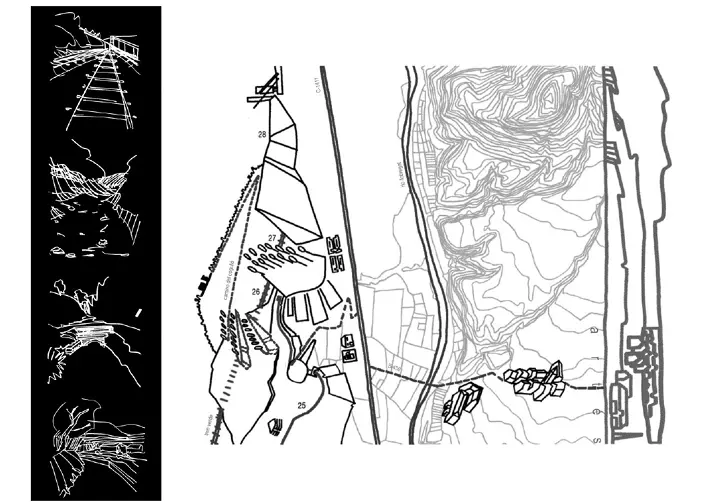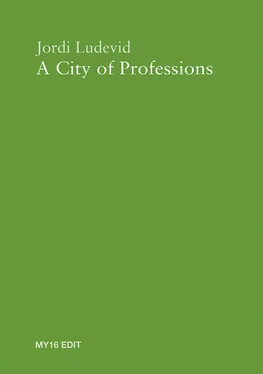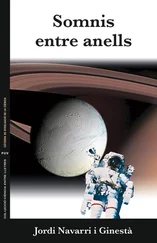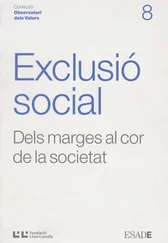The Debate
There are currently too many unanswered questions in our workplaces and in our professional institutions. And it is a fact that most university students or graduates, if they were asked, would not have an answer either. There has been an obvious «eclipse», an «overshadowing» of the professional fact. It is true that the terms professionalism, profession and professional are used profusely, but in general with a lack of knowledge of their meaning and history, their legal regime and the profound reality of their rights and obligations. And, above all, it is a failure to recognise their powerful capacity to articulate and structure society, cities and the network society.
Given the present circumstances, therefore, it is significant that there is no lively debate and no flow of this information in universities,11 schools, faculties and professional bodies. With notable exceptions, the academic world lives in its own bubble and so does the world of professional associations. There has been no systematic, productive and clearheaded dialogue between them in order to educate and train not «experts, theoreticians, academics» but professionals, i.e., citizens specialised in a practical, people-oriented knowledge.
During this possible debate, we will need to pay close attention to some fundamental aspects of the context, regarding which there is still little awareness and limited reflection, and which have a decisive influence on the present and future of professional activity: namely, cities and the network society. Exploring the profound and strategic relationship, if any, between the professional fact and cities and the network society would undoubtedly offer a more precise and up-to-date picture of the professional fact and of the professions, which would of course also be absolutely fundamental in the effort toward recovering the words.
Finally, it is remarkable, and at the same time little known, unrecognised, that some very important and significant voices from the academic and cultural world have clearly positioned themselves in favour of the professional fact. Surely the time has come to take a step forward and publicly align with them, facilitating and proposing the foundations for a debate that is entirely necessary for regeneration.
5Not all specialised social collectives have organised themselves into professions. Some have organised themselves into guilds, trade unions or other forms of organisation.
6This is a significant difficulty. See, for example, Jordi Ludevid, «Madrid-Barcelona», La Vanguardia, 14 July 2018. https://www.lavanguardia.com/local/barcelona/20180714/45879395252/madrid-barcelona.html
7In the sense of creating and responding to new and uncertain situations.
8The concept of individualisation, introduced and discussed in sociology by Castells, Bauman, Beck and others, is key to describing the current moment, the network society and the new citizenship.
9Greek for ‘excellence’, ‘virtue’.
10The contributions of the American philosopher and educator Donald Schön regarding the training of professionals are fundamental. See La formación de profesionales reflexivos, Barcelona: Paidós, 1992.
11«Research has distanced itself from professional practice. The crisis of confidence in the professions and their training institutions is rooted in the prevailing epistemology of practice» (Schön, Ibid.).

III. The Sallent dump
The landscape of salt mining, of industry, the 20th century,
the valley ends, the plain begins... A crossroads.
III. A Long History
The poet expressed it in a single verse: «He who loses his origins, loses his identity». Indeed, in order to understand the professional phenomenon and to engage in a reflection based on a relatively solid foundation, we need to situate the professions in their historical context, to understand their past and their evolution in order to assess and analyse them before interpreting their future. Where do we come from? What is the professional phenomenon and what has it been historically? What is its legal and conceptual nature?
We have come to call thoughtful remembrance historical memory or collective memory. Knowing the past empowers us. In today’s world, recovering our memory, and with it the meaning of the professions, is a potentially enlightening exercise for everyone, and in a special sense for cities too. Although it is little known or has been forgotten, the professional fact was born in cities, in the Greco-Roman polis, and to support them – a public connection which continued up until the 19th century.
Curiously, and all too often, we have taken on responsibilities in institutions or associations with a certain historical and conceptual ignorance of the essence of what we were dealing with. This has undoubtedly weakened our leadership performance. However, we can make up for this lack, brought about by the absence of an updated and contemporary historical narrative, by investigating a reality that often is not what it seems or what people say about it. We need to disseminate a contemporary narrative on a regular basis, perhaps in a regulated manner. As things stand, failing to recover our historical memory is tantamount to denying it. For, indeed, «he who loses his origins, loses his identity».
More than 100 years have passed since the sociologist Max Weber wrote his well-known theses on professionals in 1905: The Protestant Ethic and the Spirit of Capitalism.12 Since then, the world has changed a lot, it goes without saying. So, too, have the professions, of course, although that may not always seem to be the case due to the prevalence, in certain fields, of some poorly understood, vaguely «Weberian», theses. A profession is more than just a way of earning a living.
The following brief historical journey takes us from Hippocrates to Cicero and from Cicero to Max Weber, through the Middle Ages and the Napoleonic university to the present-day network society. In other words, from Greece to Rome, from Rome to the Middle Ages and from the Middle Ages to the Protestant Reformation, the nation state and industrialisation. And through outsourcing and digitalisation to the present day.
12Max Weber, The Protestant Ethic and the Spirit of Capitalism (Penguin, 2002), first published in 1905.
Hippocrates
Like so many other things, the professional fact was born in Greece.13 Hippocrates of Kos (Kos, c. 460 BC - Thessaly, c. 370 BC) was an ancient Greek physician who practised during the so-called Age of Pericles. Considered to be one of the most prominent figures in the history of medicine, many authors refer to him as the father of medicine and, by extension, of the professional phenomenon. His intellectual school revolutionised medicine in his time, establishing it as a discipline separate from other fields with which it had traditionally been associated, transforming the practice of medicine into a profession.
The term profession (from the Latin professio, -ōnis) designates a trade, job or occupation that is normally exercised in exchange for remuneration. It also defines the set of professionals who exercise it. Professional activity requires specialised and practical knowledge, professional training, educational training at different levels depending on the case, mastery over the content of the work, and organisation through professional associations, in addition to ethical standards, professional ethics and a certain spirit of service to the community. The term professional emerged to define the person who carries out a profession.
It is worth taking particular note of the Hippocratic Oath, a public oath that may be taken by those who have received a degree in medicine. It has a civic and ethical content, which guides physicians in the practice of their profession. In its original form, it regulated obligations to the teachers and their families, to pupils, to colleagues and to patients. From the 19th century onwards it became common, but not universal, to swear an oath based on an updated text, which differed according to the values of each time and place. Wherever it is preserved, it is considered a rite of passage or initiation after graduation, prior to entering the professional practice of medicine.
Читать дальше













